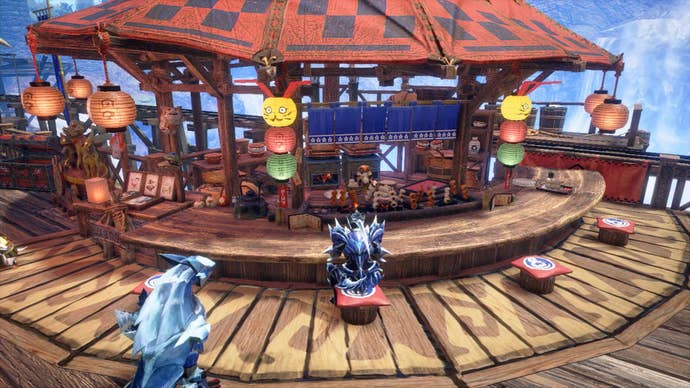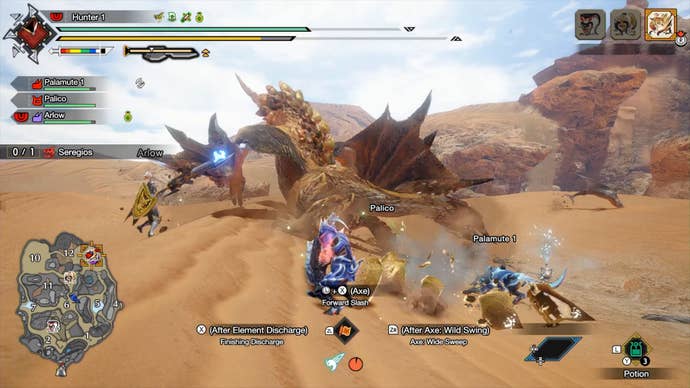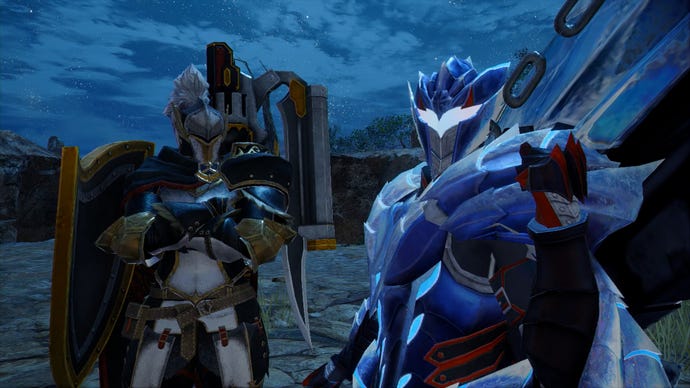With Follower Quests, Monster Hunter Rise: Sunbreak could finally capture a dedicated single-player audience
A headline addition to Monster Hunter Rise: Sunbreak are single-player quests, with AI supporting characters – and they’re game-changers.
For most people, Monster Hunter isn’t the first series that springs to mind when you think ‘single-player game’. Though there’s a lot of stuff in the action titles that you can do on your own, the series is usually thought of as a cooperative affair; get some mates, sharpen your weapons, bash some skulls. Rinse, loot, carve, repeat.
With Monster Hunter Rise: Sunbreak – a massive new expansion landing on the PC and Switch game from June 30 – it looks like Capcom is trying to change that. As well as a new difficulty mode, new (and returning) monsters, a new hub area, new maps, and new gear, you will also get chance to enjoy Follower Quests: single-player only affairs that see you heading into battle accompanied by NPCs from the world of Rise.
These characters will help you hunt, just like normal human players would – except, as we found after going hands-on with the title – sometimes these characters are better than human helpers. Each follower – you can unlock multiple on your run through Sunbreak’s story – will utilise a distinct fighting style. Some characters (like Hinoa and Minoto) will return from Rise’s main story, but some will be newcomers for Sunbreak’s new Elgado hub.
It doesn't sound great, right? Maybe like an afterthought, or something tacked on for people who can’t get a full lobby together. It’s not. In fact, these AI companions might be the best bit of the new expansion.
_LOcxNWs.jpg?width=690&quality=70&format=jpg&auto=webp)
“With Monster Hunter Rise, you may remember during the Rampage segments of that game, we had a feature where characters from the village would placeable in locations within the stronghold,” explains Monster Hunter Rise: Sunbreak director, Yoshitake Suzuki, when we ask where the idea for these Follower Quests came from. “And there were kind-of fun interactions between the player and the NPCs as you went through the Rampage quest. They'd be calling out voice lines, and that kind of thing, and it brought a new depth to the interactive nature of these characters – who, normally, you might only see standing around a village at their various posts.
“We wanted to really build on that aspect, where people really enjoyed actually getting to know the characters better. Especially because there's a variety of unique and appealing characters throughout the game.”
.jpg?width=690&quality=70&format=jpg&auto=webp)
Since the Rampage itself, as a phenomenon, is wrapped up in the storyline of Monster Hunter Rise, it isn't returning for Sunbreak. Given that there's a new crisis (and a new location) coming in Sunbreak, the studio thought “it would be a shame to lose that level of intimacy – or whatever you want to call it – with the characters” and found a way to bring it back in more traditional hunts.
“While multiplayer is still a key aspect of Monster Hunter, and one of its strongest points, we do understand that some players like to play single player – either alongside multiplayer, or even exclusively,” Suzuki continued. “So we thought it’d be good to take the concepts of [having more intimacy with the NPCs] and [playing alongside them] and combine them into a new way of playing single-player quests for sort of a multiplayer-like experience, if you will.
“[Single-player] is never going to replace multiplayer in the position that it has within Monster Hunter, but these Follower Missions will let you get that feeling of hunting as a party, while also letting you enjoy interactions with the characters from the storyline.”
.jpg?width=690&quality=70&format=jpg&auto=webp)
Perhaps the most impressive thing about the Followers is the way they use weapons; these aren’t amateurs – the kind of button-mashing greenhorns you’d pick up in an open lobby on release day. No, these are consummate professionals that know how to wield a Switch Axe. In our quest, we teamed up with grizzled veteran Arlow, Gunlance extraordinaire. As a Sword and Shield main, I am used to getting up close and personal with monsters and blocking or dodging their wrath as I whittle down the health of their various appendages.
Lo and behold, Arlow got in there – up close and dirty – with me, blocking when I blocked, dodging when I dodged, and laying down the nastiest combos when the creature was stunned, down, or trapped. Given I rarely team up with Gunlance users, to me, it felt like playing with a human player. A really good one. And that is Capcom’s intent.
.jpg?width=690&quality=70&format=jpg&auto=webp)
“We're aware that – especially if you're playing a single player and you have maybe one or two weapons that you specialise in – you might never really get to see or experience what all 14 weapon types can bring to the table,” says Suzuki. “So we designed the content in Sunbreak in such a way that once you've unlocked each follower through their own specific quest (where you go out with them one-on-one and you clear that quest), they become available on the other more general follow requests.
“You'll then be able to choose up to two followers to come with you, and each of them have multiple weapons that they can actually choose from. They'll have one they specialise in (like Arlow's Gunlance), but they'll have a different subset of weapons that you can choose.
“So it's a great way to bring someone along who can demonstrate exactly what it means to be a certain kind of weapon user – without needing to go out and find people who are going to be using those weapons with you.”

It was no mean feat, making the Followers feel this good. Sure, Monster Hunter has had AI companions in the past – in the form of the buddies, the Palicos and Palamutes. But those characters have only ever been there as supports; they’re not actually slaying the monsters with you, they’re supplementary. For Sunbreak, Capcom needed to approach AI with fresh eyes.

“To be honest, apart from a few small things, we've essentially rebuilt (or built) AI for the followers from scratch, for Sunbreak,” Suzuki tells us. “That was extremely challenging to achieve. The work of balancing the follower AI for each quest that they appear in was difficult as well; if they're too weak, then they will feel useless or you have to babysit them, and it'll be more of a burden to bring them. If they were too OP – and you're going out with them and you feel like you're just tagging along because the followers are smashing a monster and you have nothing to do – then that wouldn’t be satisfying for most people, I don’t think.
“Treading that fine line between overpowered and useless, and making sure that it felt valuable to have them with you – and even potentially learn from them as you observe new tactics and see how they react to monster behaviours – was a lot of work. We think it can be a really satisfying way to play the game, and there's something a bit different in the gameplay even for those that enjoy multiplayer.”

If you’re worried that these Follower Quests are going to shape the path Monster Hunter treads from here on out, don’t worry; Capcom knows that the MonHun elite still come to these games for group hunts, and it knows that single-player is nice, but it’s likely never going to ‘take over’ as the series focus. From the way this interview went, that sounds as likely as putting health bars in for the monsters (God forbid).
“We probably have had a somewhat increased focus on the story aspect of the game since Monster Hunter World, I would say,” Suzuki reflects. “That said, we know that people come to the game for different things. The world of the games itself, outside the specific story elements, is something I think a lot of players enjoy about Monster Hunter.
“The story is one aspect of that, but I think it all combines together in different amounts for every title that we make. Between a game’s world, a game’s story, the characters, and then the monsters and the action… the exact recipe of what goes into each title is something that we consider on a game-by-game basis, depending on the concept that we're looking to achieve.”
Like Rise before it, Sunbreak represents another step forward for Capcom and its hugely influential action series. Where we used to get brand new games to add this sort of content to Monster Hunter (back in the PSP and Wii days), we now get expansions – a fairer proposition to developer and player alike. But Sunbreak feels like a new game – and a bold new direction – for a development team that never shies down in the face of a challenge, no matter how imposing.
And that feels very apt for a game about little hunters going up against towering, ancient monsters.
Monster Hunter Rise: Sunbreak releases on June 30 for Steam and Switch.



